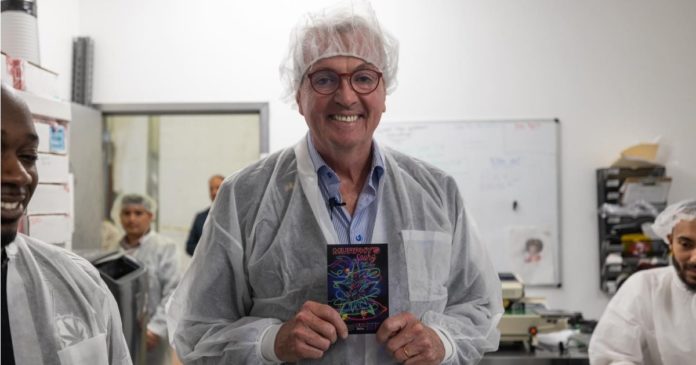New Jersey Governor Phil Murphy recently visited a recreational cannabis producer that named a variety after him. Meanwhile, as recreational marijuana booms, the state’s medicinal program flounders.
The Governor took a peek behind the scenes at Prolific Growhouse in Mount Holly last week to see how the state’s cannabis industry has matured since legalization was passed – and obviously liked what he saw.
“Entrepreneurs like David Nicolas give me hope that we can build a strong and diverse industry that reverses some of the worst effects of the War on Drugs,” he said.
He’s pictured above with a flyer for “Murphy Sourz”, which is described as having a flavour mix of sour lemon, sweet tangerine, with hints of pine … and diesel of all things.
The state’s adult-use market has been booming since the first licensed recreational sales began in April 2022. Sales for the first quarter of this year totaled more than USD $201 million, a 38% increase compared to the same period last year.
But this has come at a heavy cost to the state’s medical cannabis program. We reported last month that after hitting its peak in May 2022 with 129,369 registered patients, numbers dropped rapidly, and in April this year had plummeted to 80,042 patients. Checking the numbers again, the state’s Cannabis Regulatory Commission (NJ-CRC) reports a further drop to 78,045 registered patients in May. This is a decrease of nearly 40% in just two years.
The drop has been attributed to patients being unable to afford fees being charged by some doctors. The NJ-CRC has previously indicated it was doing everything in its power to try and ensure those who can benefit from medical cannabis remain in the program. This has included slashing registration and renewal fees for enrolled patients and their caregivers from as much as $50 a year to $10 a year for physical cards, and free digital-only ID cards.
But the exodus of patients from medical to recreational continues.
New Jersey’s cannabis market raked in $800,279,300 in medicinal and recreational cannabis sales in 2023, and sales beyond $1 billion are expected in 2024. But it looks like medicinal sales will get an increasingly small slice of the pie. It remains to be seen at what point the state’s medicinal program will be dropped if numbers keep dwindling regardless of the NJ-CRC’s efforts.


